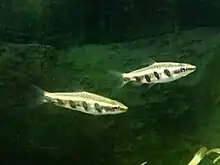Nannostomus espei
Nannostomus espei, (from the Greek: nanos = small, and the Latin stomus = relating to the mouth; espei = in honor of tropical fish importer/exporter, Heinrich Espe),[2][3] commonly known as Espe's pencilfish or barred pencilfish, is a freshwater species of fish belonging to the characin family Lebiasinidae.[4] It was first described in 1956 by Herman Meinken from the Mazaruni River system in Guyana and to date this is its only known location.[5] It is notable amongst the genus in that the dominant body pattern consists of five broad, comma-like patches instead of the more normal horizontal stripes seen in the rest of the genus. This pattern of patches is assumed by other species at night, but only N. espei displays the pattern permanently and in daylight.
| Barred pencilfish | |
|---|---|
 | |
| Scientific classification | |
| Domain: | Eukaryota |
| Kingdom: | Animalia |
| Phylum: | Chordata |
| Class: | Actinopterygii |
| Order: | Characiformes |
| Family: | Lebiasinidae |
| Genus: | Nannostomus |
| Species: | N. espei |
| Binomial name | |
| Nannostomus espei Meinken, 1956 | |
The fish is named in honor of ornamental fish importer-exporter Heinrich Espe, who furnished specimens to Meinken for identification.[6]
References
- "barred pencilfish". IUCN Red List of Threatened Species.
- Froese, Rainer and Pauly, Daniel, eds. (2013). Species of Nannostomus in FishBase. April 2013 version.
- "Fish Name Etymology Project: Characiformes. Scharpf & Lazara". The Etyfish Project. Retrieved 11 November 2019.
- "ITIS report Nannostomus espei TSN 163103". Retrieved Feb 17, 2012.
- "Fishbase report Nannostomus espei". Retrieved Feb 17, 2012.
- Christopher Scharpf & Kenneth J. Lazara (22 September 2018). "Order CHARACIFORMES: Families CURIMATIDAE, PROCHILODONTIDAE, LEBIASINIDAE, CTENOLUCIIDAE and ACESTRORHYNCHIDAE". The ETYFish Project Fish Name Etymology Database. Christopher Scharpf and Kenneth J. Lazara. Retrieved 2 November 2021.
